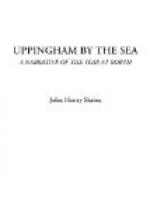The outlook then was not unclouded. But one bright day we had before we said good-bye to the past, and fronted the future cares. Sir Pryse had invited the school to spend a day with him at Gogerddan, Thursday, July 20th, the last day of term. Room was found for all his guests to dine together in a large barn near the house, where, from the high and narrow windows, the light fell in picturesque mellowness on the close-packed ranks. A match was played in the grounds between the school and an Aberystwith eleven; the rest whiled away the afternoon right pleasantly among the flowers and grass-slopes. At a pause in the game there was a gathering on the lawn to watch the execution of a little surprise which the cricketers had prepared for our host. From a box which had been perilously smuggled in, was produced a memorial gift (it consisted of a study-clock and inkstand), which “the cricketers of Uppingham begged Sir Pryse to accept, as a slight acknowledgment of his special liberality to themselves;” for so it was set forth in an address which the captain of the eleven proceeded to read to him. Our host, as much startled as if the present and the address had been shot at him out of a cannon, answered in a brief but not the less effective speech. Then, as if to relieve the warmth of feeling generated between us, a piano was run into the bow of an open window, and the choir outside delivered themselves of some hearty music. Soon the evening train was carrying us home for the reading of the class-list and the prize-giving. In the customary address, the Headmaster could congratulate the school on having borne themselves well during the great time in the school’s history which this day brought to a close: he called on them to “come back with the soldier spirit” to face whatever remained.
There was dark work going on in the street that night. When dawn broke, it disclosed an array of flags, streamers, and devices, along the approach to the station, where “the special” was waiting. Prominent among the devices was the motto, Au revoir. For the feeling it spoke, all were grateful; but not all rejoiced in the occasion of it. The train moved out of the station with the school, to a boy, on board of it, to the sound of a farewell cheer, and so the curtain fell on the first act of the play.
CHAPTER X.—A WINTER CAMPAIGN.
Sanitas sanitation, omnia sanitas.
The farmer vext packed up his beds and chairs, And all his household stuff, and with his boy Betwixt his knees, his wife upon the tilt, Sets forth, and meets a friend, who hails him, “What! You’re flitting!” “Yes, we’re flitting,” says the ghost (For they had packed the thing among the beds). “Oh, well,” says he, “you flitting with us too— Jack, turn the horses’ heads and home again.”
TENNYSON, “WALKING TO THE MAIL.”




